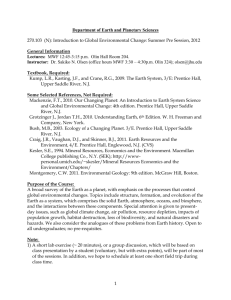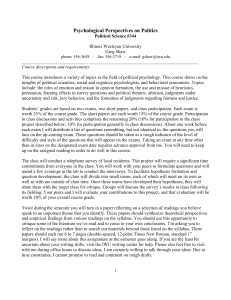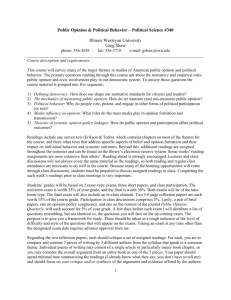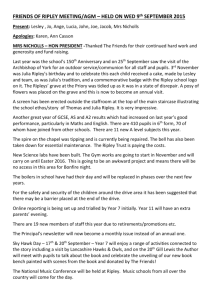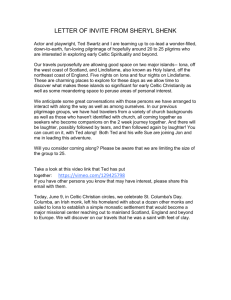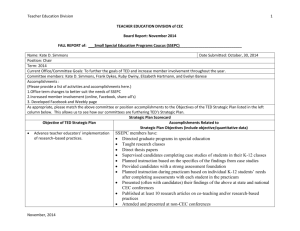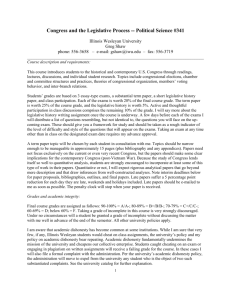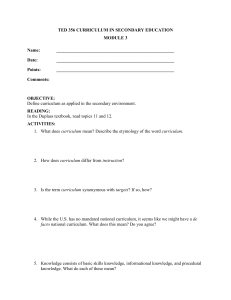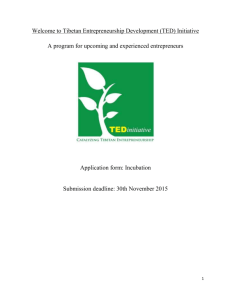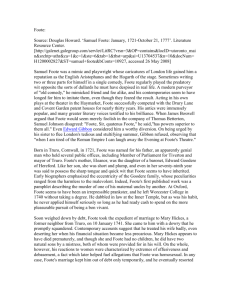Education 100 - Amazon Web Services
advertisement
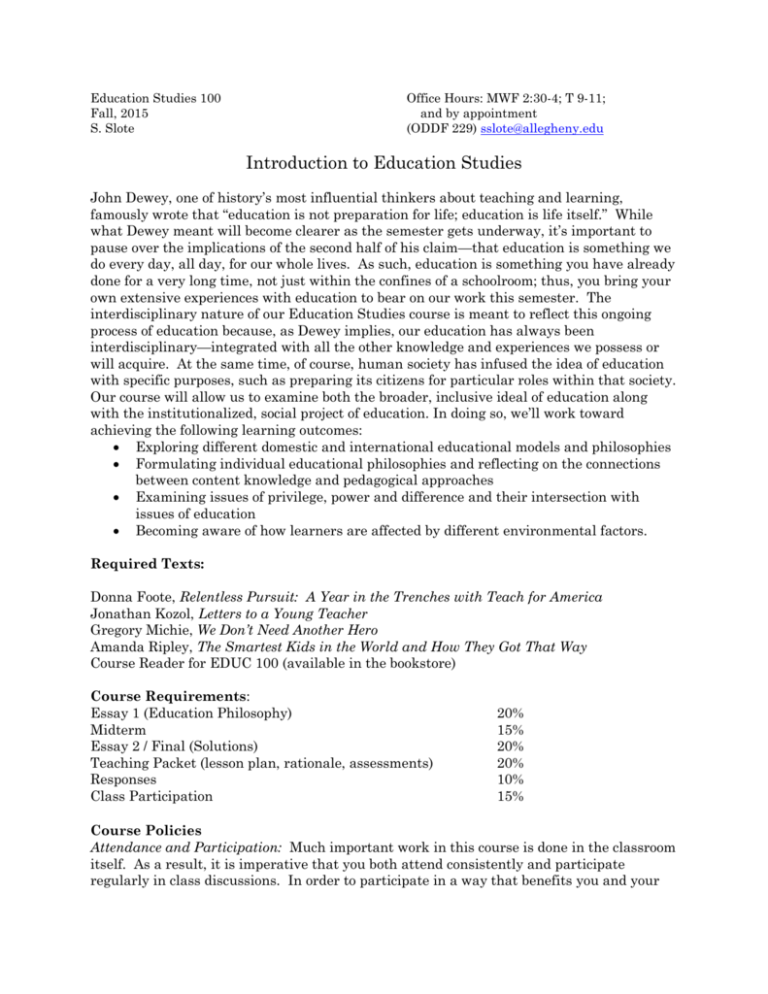
Education Studies 100 Fall, 2015 S. Slote Office Hours: MWF 2:30-4; T 9-11; and by appointment (ODDF 229) sslote@allegheny.edu Introduction to Education Studies John Dewey, one of history’s most influential thinkers about teaching and learning, famously wrote that “education is not preparation for life; education is life itself.” While what Dewey meant will become clearer as the semester gets underway, it’s important to pause over the implications of the second half of his claim—that education is something we do every day, all day, for our whole lives. As such, education is something you have already done for a very long time, not just within the confines of a schoolroom; thus, you bring your own extensive experiences with education to bear on our work this semester. The interdisciplinary nature of our Education Studies course is meant to reflect this ongoing process of education because, as Dewey implies, our education has always been interdisciplinary—integrated with all the other knowledge and experiences we possess or will acquire. At the same time, of course, human society has infused the idea of education with specific purposes, such as preparing its citizens for particular roles within that society. Our course will allow us to examine both the broader, inclusive ideal of education along with the institutionalized, social project of education. In doing so, we’ll work toward achieving the following learning outcomes: Exploring different domestic and international educational models and philosophies Formulating individual educational philosophies and reflecting on the connections between content knowledge and pedagogical approaches Examining issues of privilege, power and difference and their intersection with issues of education Becoming aware of how learners are affected by different environmental factors. Required Texts: Donna Foote, Relentless Pursuit: A Year in the Trenches with Teach for America Jonathan Kozol, Letters to a Young Teacher Gregory Michie, We Don’t Need Another Hero Amanda Ripley, The Smartest Kids in the World and How They Got That Way Course Reader for EDUC 100 (available in the bookstore) Course Requirements: Essay 1 (Education Philosophy) Midterm Essay 2 / Final (Solutions) Teaching Packet (lesson plan, rationale, assessments) Responses Class Participation 20% 15% 20% 20% 10% 15% Course Policies Attendance and Participation: Much important work in this course is done in the classroom itself. As a result, it is imperative that you both attend consistently and participate regularly in class discussions. In order to participate in a way that benefits you and your 2 fellow classmates, you will need to prepare readings and assignments in an active, engaged manner. (Criteria for grading class participation can be found at the end of the syllabus.) Each student is permitted two unexcused absences; unexcused absences beyond this number will result in a penalty of 2 points off your final grade. (For example, if you earn a final grade of 85, but have three additional unexcused absences, your final grade becomes a 79.) Plagiarism: Needless to say, learning only happens when your work is your own. Like you, I’m also bound by the Honor Code and must refer any suspected plagiarism to the Honor Committee. All outside sources used in your work must be properly cited according to MLA guidelines. If you have any questions about the proper use and acknowledgement of sources, please don’t hesitate to ask. Please Note: Students with disabilities who believe they may need accommodations in this class are encouraged to contact Disability Services at (814) 332-2898. Disability Services is part of the Learning Commons and is located in Pelletier Library. Please take this step as soon as possible to ensure that such accommodations are implemented in a timely fashion. Course Schedule: Note: Readings from the Course Packet are marked (P); handouts are marked (H) Schedule for Fall 2015 8/26 8/28 W F Introductions Brodhead, “Taking Democracy to School” (P); Sir Ken Robinson, “Changing Education Paradigms” (TED: http://www.ted.com/talks/ken_robinson_changing_education_paradigms ) Thinking about Education 8/31 9/2 M W 9/4 F John Locke, “Some Thoughts Concerning Education” (P) Jean-Jacques Rousseau, from Émile (P); Wollstonecraft, from A Vindication of the Rights of Woman (P) John Dewey, “My Pedagogical Creed” (P) 9/7 9/9 9/11 M W F Paulo Freire, from Pedagogy of the Oppressed (P) bell hooks, from Teaching to Transgress (H) Gregory Michie, We Don’t Need Another Hero, chapts 1, 3, 4 Methods Week 9/14 9/16 9/18 M W F Readings from Esquith and Lemov (H) Esquith and Lemov, cont. (H) Esquith and Lemov (H); Essay 1 due (Philosophy Essay) Contemporary Issues in Education 3 9/21 M Friedman, “Can’t We Do Better” (P); Strauss, “Schooling Ourselves”; Ripley, The World’s Smartest Students, Prologue and Chapt.1; PISA packet (H) Jonathan Kozol, Letters to a Young Teacher, chapts 2-3, 6; Dr. Rita Pierson, (http://www.ted.com/talks/rita_pierson_every_kid_needs_a_champion) Diane Ravitch, “Hijacked,” from The Death and Life of the American School System (P); Michie, “Elephants in the Room” (Chapt. 12) 9/23 W 9/25 F 9/28 9/30 10/2 M W F Rachel Aviv, “Wrong Answer” (P) Kozol, chapts 7, 11, 12 No Class Meeting: GLCA Conference; Watch Waiting for Superman (available on Sakai) and comment on Sakai 10/5 M Kendall, “The Common Core Standards in Context” (P); Esquith, “We Won’t Get Fooled Again” (H); Jordan Ellenberg, “Meet the New Common Core” (P) Effects in Higher Education 10/7 W 10/9 F 10/12 M Mettler, “College, the Great Unleveler” (P); Deresciewicz, “The Disadvantages of an Elite Education” (P) Michelle K. “To My Eighteen-Year-Old Self, on your Departure for Cambridge” (P); Michie, chapt 11 Fall Break Examining Solutions 10/14 W 10/16 F Ripley, The Smartest Kids in the World, chapts 2-4 First Teaching Friday 10/19 M **10/20 T 10/21 W 10/23 F Midterm Exam Screening of Beyond Measure; Quigley, 7 p.m. with discussion to follow Planning Session for Your Syllabus Week; possible visitor day (tba) Teaching Friday 10/26 M 10/28 W 10/30 F Ripley, chapts 5-7 Ripley, chapts 8-10; appendix I Teaching Friday 11/2 11/4 M W 11/6 F Discussion of Teach (screening TBA) Joshua Davis, “Free Thinkers” from Wired ; Sugata Mitra, TED talk (http://www.ted.com/talks/sugata_mitra_the_child_driven_education) Paul Tough, “What If the Secret to Success is Failure?” (P); Salman Khan, “The Learning Myth”; Angela Duckworth, TED talk (http://www.ted.com/talks/angela_lee_duckworth_the_key_to_success_grit) 11/9 M 11/11 W Your Syllabus Your Syllabus 4 11/13 F Your Syllabus 11/16 M 11/18 W 11/20 F Foote, Relentless Pursuit Foote, RP; Michie, 7-8 Teaching Friday 11/23 M 11/25 W 11/27 F Foote, RP; Michie, 9 Thanksgiving Break Thanksgiving Break 11/30 M 12/2 W 12/4 F Foote, RP; TFA from the Trenches (conversations with TFA corps members) Michie, chapts 13-15 Teaching Friday 12/7 Teresa Perry, “The Historical and Contemporary Foundations for Robert Moses’s Call to Make Quality Education a Constitutionally Guaranteed Right” (P); excerpt from Robert Moses, “Algebra and Civil Rights” (P) M Final Exams are due Friday, December 11th at 7 p.m. in my office Criteria for grading class participation: While it is difficult to quantify the success of a student’s contributions to class discussion (at our best we all contribute differently), here are the general standards I will use to grade participation: A range: Participation at this level is marked by its active nature, its consistency, and its quality. When A participants read an assignment, they prepare to participate in a class discussion; they read the assignments fully, carefully and critically enough to be ready not just to respond to my questions but also to initiate discussion with comments and questions of their own. Such participants will also come to class ready to make and argue assertions about the reading and to think out loud about a text’s relation to its contexts; they will attend to the comments of others in class, agree, elaborate or civilly disagree with them, bring our attention to passages from the reading to make their point and at times connect such thinking with earlier readings or previous class discussion. In short, students who by their engagement in class discussion throughout the semester show themselves to be true students of the course material—persistently conscientious and inquiring—will get an A for their efforts. They will also make the course a lot better. (By the way, substituting quantity of participation for quality will not work.) B range: Students who come to every class, have almost always done all the reading, and consistently respond to the questions of others in a way that demonstrates their command of the reading will earn a B participation grade. What separates this effort from an A one is not so much quantity (teachers are remarkably good at detecting bs) as the level of preparation—one’s reading and thinking—that has gone on before one gets to class, especially the kind that enables students to initiate discussion. But you can’t get a B participation grade by just showing up, either, or by talking every once in a while. 5 C range: A C participant comes to almost all the classes (no more than four unexcused absences), usually has done most of the reading most of the time, but not with the energy necessary to demonstrate through participation their ongoing engagement with the material. Such a discussant contributes infrequently, maybe one time every other class. D range: Automatic pilot mode. You were physically there most of the time, spoke a few times maybe, but that was it. F: Not coming to class is the traditional route.
